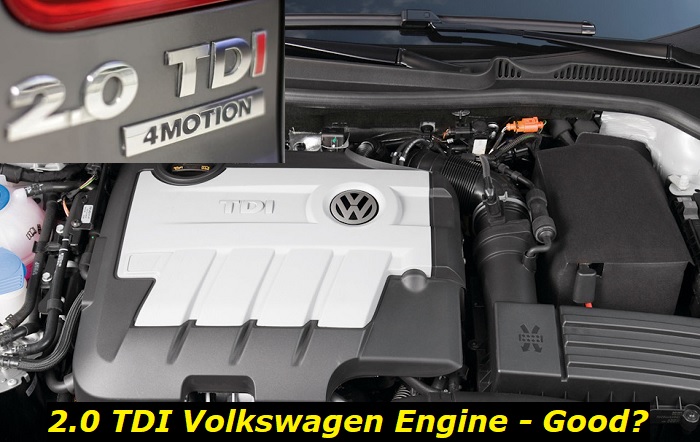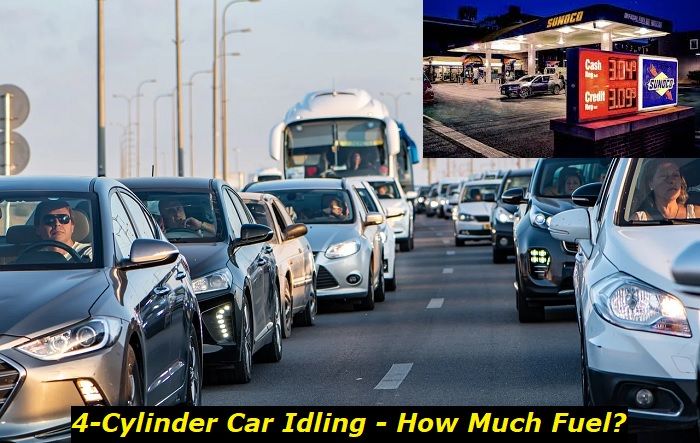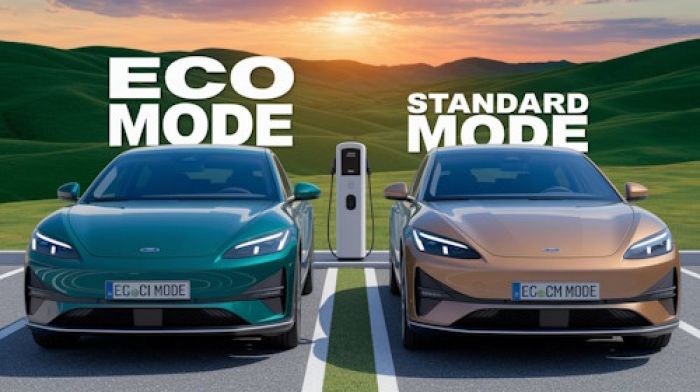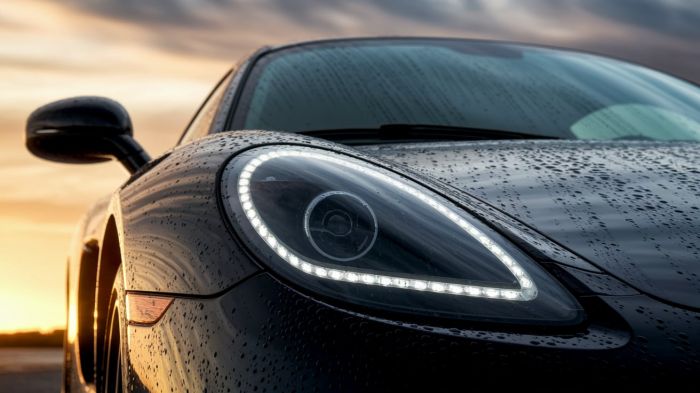If you take Volkswagen/Audi engines and compare them, you will clearly see that the 2-liter diesel engine has been one of the most popular in the world. Yes, one of them was engaged in the so-called Dieselgate and stopped selling in the US after 2015, but you can still buy a lot of cars used with the 2.0 TDI under their hoods.
Today, we'll talk about the 2.0 TDI (EA188) engine and discover its main features, pros and cons, common problems, longevity, and some other important facts. It means we'll basically take this engine apart to the little parts and see if it's still good enough to consider buying a vehicle that is powered by it.

Key features and my opinion about the engine
- Production years:2003-2011
- Average lifespan of 2.0 TDI:190,000-230,000 miles
- Fuel supply type:Pump Dusedirect injection
- Power range:140-170 hp
- Fuel efficiency:good
- Engine block material:cast iron
- Engine reliability score:high
- The most common problems:coolant leaks, oil consumption, pump duse injection problems, EGR and DPF issues.
What should you know about the EA188 engine?
We are talking about the EA188 generation of engines that were produced up to 2010 but you should know that most of these facts are also true for the EA189 series made after that and involved in the emission scandal we've mentioned earlier.
So, the EA188 engines weren't that bad. A lot of owners have reported these engines to live a long life and cause no major problems. The 2.0 TDI was developed from the ancient 1.9 TDI that was basically installed in nearly all European cars made by Volkswagen and Audi (and also Skoda and Seat brands). So, this was a very well-known and simple engine.
Here's what you should know about the 2.0 TDI:
- there are a couple of versions of the engine - mainly they differ with the number of valves - one has 8 valves while the other offers 16 valves;
- most engines sold in the US were 16-valve engines with the highest possible output, they are less durable than other types, but still pretty good;
- you can find versions called BKP, BKD, BMM, BMP, BMR, and BMT - they are slightly different but embrace the same technologies;
- all of these engines are famous for impossible gas mileage - a Passat in Europe powered by the 2.0 TDI engine could show up to 55 MPG on highways;
- all engine types in the 2.0 TDI family have high-mileage problems that make them economically bad to drive, so they are not the most reliable engines in the world;
- most of these engines are pretty old now, so you should think twice if you want to buy a used Audi or Volkswagen powered by the 2.0 TDI EA188 engine.
This is a decent diesel engine that still has its own pros and cons. We would say that in Europe this was a basic engine for a lot of different vehicles and it was extremely popular among buyers thanks to its wonderful gas mileage. But owners have to pay a lot to maintain these engines in good condition and keep using them even now.
We know for sure that in America owning a vehicle powered by the 2.0 TDI of the EA188 generation wouldn't be a very wise decision new. Getting parts and finding a good mechanic will take you a lot of time and effort. And believe us, you will need a good mechanic and a lot of parts to keep driving your wonderful VAG car.
How long will the 2.0 TDI go?
The longevity of the 2-liter diesel engine is hard to predict. Some of them gave up before hitting 150K miles while some others could go up to 300,000 miles with no major issues. We believe, the average point where you should think about changing your Volkswagen with the 2-liter diesel engine under the hood is 200,000 miles, although the longevity should be considered anywhere near 220,000 miles.
The longevity, of course, is not a stable figure and it will fluctuate from one engine to another. It highly depends on how well you maintain this engine, how often you change the oil in it, and how carefully you drive your vehicle.
Why do people love Volkswagen 2.0 TDI engines?
Although diesel engines are now out of trend even in Europe where they are traditionally very popular, we still see a lot of reasons why people keep driving and even buying cars equipped with 2-liter diesels. It's not only about traditions in Europe or the need to buy something exotic and unusual in the US.
Here are some pros of the 2.0 TDI engine:
- it offers insane MPG even in the city, and it saves your money at fuel pumps;
- it works pretty smoothly without shaking or vibrating too much;
- the engine is very reliable up until it puts on 200K miles or more;
- the torque in these engines is very high and this offers a great driving experience;
- you can tow whatever you want with these engines thanks to high torque;
- overall, it's slightly cheaper to own than a petrol engine with the same power and torque.
Still, American buyers will obviously have problems with more attention at fog tests and also with finding needed parts for this engine. It's not that easy to maintain and repair the 2.0 TDI of the older generation in the US.
But all EA188 engines have one important advantage: they have a pretty simple construction. So, nearly any mechanic who has some experience with diesel engines can easily sort out the majority of possible issues.
What are the common problems with the 2.0 TDI engine?
Volkswagen doesn't offer new diesel engines in the US. But it doesn't mean that car mechanics who specialize in VW diesel vehicles are now dying of boredom. No, they have a lot of work because these 2-liter diesel engines are extremely unreliable when they hit a certain mileage. They start showing dozens of problems and you may just go bankrupt trying to solve them all at once.
Here are some of the most obvious issues:
1. Fuel pump failure
Fuel pumps in diesel engines are designed to create high pressure in fuel lines. This is the only possible way to ignite diesel fuel in the combustion chamber. So, this high pressure means a lot of load to the fuel pump. You are likely to change the fuel pump every 80,000 miles which is very soon for a VW car.
Unfortunately, the fuel pump is not only expensive but is also very hard to replace because of its location and fastenings. So, you'll have to pay some money to specialists.
2. Fuel injectors that cost like pieces of gold
Diesel fuel injectors are very often the main problem of diesel cars. In a Volkswagen or Audi vehicle with the 2.0 TDI under the hood, you will likely have issues with fuel injectors at about 150,000 miles. And you will have to replace them which may cost you approximately the same as buying and installing a remanufactured engine.
3. Oil consumption
These engines love consuming oil. Even when they are under 100,000 miles, they can burn some oil and you won't be able to do anything with this. Also, excessive oil consumption may lead to low oil levels and engine damage eventually. You should check the oil levels in the 2.0 TDI engine every now and then to avoid this problem.
4. EGR and other ecology equipment
Diesel ecology equipment is certainly on the dark side of the world. Take EGR, for example. In your 2.0 TDI engine, this EGR serves to send some exhaust gas back to the combustion chamber to burn it once more and avoid a higher emissions rate. But it can just get stuck or clogged and you'll have to spend hundreds of dollars for cleaning and repairing the system.
5. Turbocharger issues
Not all turbochargers in 2.0 TDI VW engines live as long as the engines can survive. Very often, drivers need to replace their turbochargers after just 120,000 miles or even sooner. This may be avoided just by using the original oil without experimenting with its viscosity and other important features.
Is this engine money efficient?
Yes, we can say that the 2.0 TDI engine from the EA188 generation was very money efficient when it was new. After this engine hits 200,000 miles, it's not efficient anymore. It will require your money and attention really often. It means you will need to invest in the vehicle much more than you expect to invest. And this may lead to huge costs. Sometimes, it's cheaper to sell the vehicle to a scrapyard and just to buy a fresher Volkswagen to avoid those problems.
Final words
We wouldn't say that 2.0 TDI engines are really bad. But they are old now and we know too much about their problems that are obviously high-mileage issues. We wouldn't recommend anyone to buy vehicles equipped with 2.0 TDI engines by Volkswagen because soon it will be almost impossible to maintain and repair them. But we still consider these engines good and history-breaking inventions.
About the authors
The CarAraC research team is composed of seasoned auto mechanics and automotive industry professionals, including individuals with advanced degrees and certifications in their field. Our team members boast prestigious credentials, reflecting their extensive knowledge and skills. These qualifications include: IMI: Institute of the Motor Industry, ASE-Certified Master Automobile Technicians; Coventry University, Graduate of MA in Automotive Journalism; Politecnico di Torino, Italy, MS Automotive Engineering; Ss. Cyril and Methodius University in Skopje, Mechanical University in Skopje; TOC Automotive College; DHA Suffa University, Department of Mechanical Engineering






Add comment